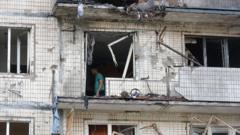Oleh Voroshylovskyi and other Ukrainian defense officials express deep concerns over the impact of diminishing American military support on their combat capabilities.
Pause in U.S. Military Aid Sparks Worries in Ukraine Amid Escalating Russian Attacks

Pause in U.S. Military Aid Sparks Worries in Ukraine Amid Escalating Russian Attacks
With U.S. suspending key weapon deliveries, Ukraine braces for intensified Russian air assaults and questions the reliability of its ally.
As the conflict between Ukraine and Russia intensifies, recent changes in U.S. military support have raised alarms among Ukrainian defense forces. A few months back, Oleh Voroshylovskyi, commander of a Ukrainian drone defense unit in Kyiv, welcomed an American-supplied Browning machine gun to bolster his defenses. However, with the U.S. government announcing a pause in the delivery of crucial weapons, including air defense interceptors, anxiety has swelled regarding Ukraine's ability to withstand escalating Russian aerial attacks.
In an interview, Voroshylovskyi lamented the suspension's potential repercussions on combat effectiveness, stating, “This will have a serious impact.” The recent freeze affects a range of U.S. military technology, notably missiles for the advanced Patriot air defense systems, precision artillery shells, and munitions compatible with Ukraine’s American-made F-16 jets. The exact amount of halted supplies and their immediate impact on the battlefield remain uncertain, yet Ukrainian officials perceive a troubling signal of U.S. disengagement.
Solomiia Bobrovska, a member of Ukraine's parliamentary defense committee, voiced her concerns, declaring, “Ukraine is no longer a priority, no longer at the center of U.S. foreign policy.” She pointed out that this candid communication from American officials underlines a shift in focus, as the importance of the Ukrainian conflict seems to wane in U.S. strategic considerations.
As the situation evolves, the impact on the conflict’s trajectory remains to be seen, but the unease regarding the U.S.'s commitment to Ukraine is palpable among its military leaders and political representatives. The coming weeks will be crucial in determining how Ukraine adapts to these challenges in its ongoing defense against Russian aggression.
In an interview, Voroshylovskyi lamented the suspension's potential repercussions on combat effectiveness, stating, “This will have a serious impact.” The recent freeze affects a range of U.S. military technology, notably missiles for the advanced Patriot air defense systems, precision artillery shells, and munitions compatible with Ukraine’s American-made F-16 jets. The exact amount of halted supplies and their immediate impact on the battlefield remain uncertain, yet Ukrainian officials perceive a troubling signal of U.S. disengagement.
Solomiia Bobrovska, a member of Ukraine's parliamentary defense committee, voiced her concerns, declaring, “Ukraine is no longer a priority, no longer at the center of U.S. foreign policy.” She pointed out that this candid communication from American officials underlines a shift in focus, as the importance of the Ukrainian conflict seems to wane in U.S. strategic considerations.
As the situation evolves, the impact on the conflict’s trajectory remains to be seen, but the unease regarding the U.S.'s commitment to Ukraine is palpable among its military leaders and political representatives. The coming weeks will be crucial in determining how Ukraine adapts to these challenges in its ongoing defense against Russian aggression.























